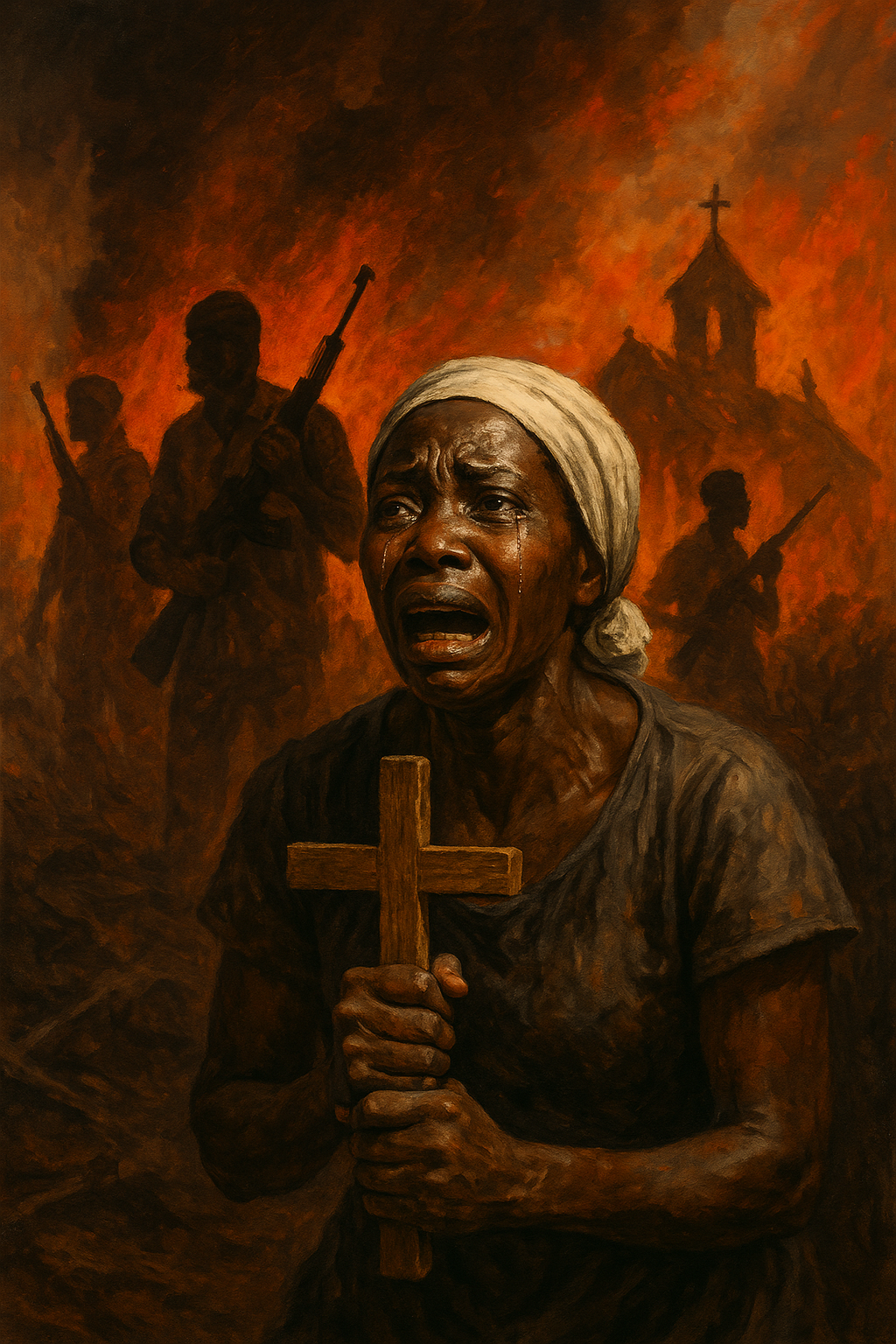
Canada Cannot Watch in Silence: The Case for Direct Intervention in Nigeria’s Christian Genocide
Share
Introduction
The world is witnessing a silent but systematic assault on Christian communities in Nigeria. Tens of thousands have been murdered, churches razed, and millions displaced—yet much of this horror passes unnoticed on the global stage. Canada, as a nation that champions human rights and religious freedom, must step up. It is no longer enough to protest verbally or issue condemnations. Canada must intervene—politically, diplomatically, and materially—to halt what is evolving into a Christian genocide.
In this article, I lay out the moral, legal, strategic, and political rationale for Canadian intervention—without fear of being labeled neo-colonial, because failing to act is a betrayal of a shared humanity.
The Evidence: What’s Really Happening in Nigeria
A Borderline Genocide in the Making
According to Genocide Watch, since 2000 as many as 62,000 Christians have been murdered in Nigeria at the hands of Islamist extremist groups and organized Fulani militants.
In 2025 alone, more than 7,000 Christians are reported to have been killed in the first 220 days of the year.
In June 2025, 200 Christian villagers were slaughtered in Yelwata, Benue State, in a sweeping massacre blamed on Fulani jihadists.
In the same region (Plateau State), dozens of Christians were massacred in multiple villages.
The Yelwa massacre of 2004, where more than 700 people died in interreligious violence, is an earlier example of how deeply roots of this persecution run.
These are not random acts of violence or spontaneous skirmishes. They are coordinated, targeted, and recurring. Many of them occur in states like Benue, Plateau, Kaduna, Taraba, and other parts of Nigeria’s "Middle Belt"—regions where Christian and Muslim populations meet and overlap. The attack on St. Francis Xavier Church in Owo (2022), which killed over 50 worshippers, further exemplifies how houses of worship are prime targets.
Some observers now call this a “silent genocide”—a genocide by attrition.
Yet that label is fiercely contested. Critics warn that the complexities of Nigeria—ethnic disputes, land conflict, climate change, weak governance—make the “Christian genocide” narrative overly simplistic or exploitative.
I contend that regardless of labeling debates, the evidence demands action.
Why Nigeria Cannot Solve This Alone
Weak Governance and Security Failure
Nigeria’s federal and state governments have repeatedly failed to protect Christian communities. Militias and extremist groups operate with impunity; prosecutions are rare and corrupt political ties are deep.
Local Biases and Religious Polarization
In some states, local actors—security personnel, political elites—are complicit or sympathetic to militants. Christians in the north regularly claim discrimination, limited ability to build or repair churches, and unequal access to justice.
Scale and Displacement
The number of internally displaced persons (IDPs) is in the millions—many Christian. Basic services collapse, entire communities vanish, and the social fabric is shredded.
Thus, external assistance is not just desirable—it is vital.
Why Canada Must Intervene
A Moral Imperative
Canada has long positioned itself as a defender of human rights, religious freedom, and international justice. We have spoken against genocide, mass atrocity, and religious persecution all over the world. If we do not intervene where Christians are being slaughtered in Africa, we forfeit moral credibility.
Legal Basis & Precedent
Under the Responsibility to Protect (R2P) norm, states must prevent genocide, war crimes, ethnic cleansing, and crimes against humanity when a state fails to do so.
Canada is party to core international human rights treaties and can invoke universal jurisdiction, diplomatic pressure, and multilateral mechanisms.
Historical precedence: Canada has intervened in Rwanda, Kosovo, and Darfur—not always successfully, but we have tools.
Strategic Interest
Nigeria is Africa’s most populous country and a key partner in West African security and economic stability. If Nigeria fractures under religious/ethnic violence, Canada’s interests—migration, trade, geopolitical influence—are at risk.
Canada’s reputation in the Global South will benefit. A bold intervention would showcase us as a principled power, not just a talk shop in Ottawa.
Domestic and Diaspora Pressure
There is already rising concern in Canada, particularly among Canadian Christians and Nigerian diaspora communities, that Canada must not remain silent. (For instance, Canadian MP Andrew Scheer has accused the international community of neglecting systematic persecution of Christians in Nigeria.)
What Intervention Should Canada Pursue
Here is a menu of escalating, feasible steps Canada should lead or join:
Action Description Risks / Mitigations
Diplomatic pressure & resolution Push for a UN Security Council statement condemning attacks, call for a UN fact-finding mission Risk of veto by major powers. Canada must rally allies (e.g., UK, EU, U.S.)
Targeted sanctions Sanction known militant leaders, complicit state actors, bank accounts, arms suppliers Backlash from Nigeria; must coordinate with allies for effectiveness
Deploy observers & peacekeepers With UN or AU, send civilian protection missions in hotspot zones Security risks; need clear rules of engagement and host-nation consent
Support Christian IDP camps & protection “safe zones” Fund and help organize camps, turn parts of territories into secure enclaves Risk of becoming targets; must tie to on-ground security
Intelligence-sharing & capacity-building Help Nigeria’s security forces with training, surveillance, forensics, early-warning systems Must guard against abuse or fueling state violence
Asylum pathway / refugee sponsorship Offer safe passage, refugee status, special visas to Christians fleeing persecution Risk of backlash; Canada must manage flight while discouraging brain drain
Legal action & accountability Support International Criminal Court investigations, universal jurisdiction prosecutions, documentation Nigeria may reject external interference; funding and diplomatic weight needed
Canada doesn’t need to do all of these—but must commit to a credible combination.
Counterarguments & Challenges (And Why They Fail)
“It’s Internal Conflict, Not Genocide”
Yes, there are layers—land wars, climate stress, ethnic tensions. But the targeting of Christians repeatedly and systematically across states, especially within religious contexts (churches, prayers, Sunday killings), indicates a religious dimension that cannot be ignored.
“Intervention Will Be Seen as Neo-Colonialism”
Canada must be humble, partner-based, and respect Nigerian sovereignty in form, while insisting on protecting basic human rights. The alternative—indifference—serves no one.
“Resource Constraints & Domestic Priorities”
Canada has limited resources. But intervention need not mean large-scale boots on the ground immediately—it can begin with diplomacy, sanctions, coordination, and selective deployments that are manageable.
“Rival Great Powers Might Object”
Yes—China, Russia, even others may push back. Canada must build coalitions (U.K., EU, African states, global Christian organizations) and use moral authority to deflect geopolitical jostling.
Call to the Trudeau Government & Parliament
1. A Special Parliamentary Inquiry — Task a joint committee to examine Nigeria’s persecution of Christians, assess Canada’s legal obligations, and report within months.
2. A Motion in the House of Commons recognizing that the violence against Christians in Nigeria meets criteria for crimes against humanity or genocide.
3. Allocate Emergency Funding — A Canadian trust fund to support protection, medical relief, reconstruction, and legal documentation in the most affected Nigerian states.
4. Appoint a Special Envoy on religious persecution, with a mandate to coordinate with Nigeria, the UN, and Christian organisations.
5. Lead an International Coalition — Bring Canada’s diplomatic weight to convene a Nigeria-focused summit with the G7, AU, ECOWAS, and Christian NGOs.
Moral Stakes: The Lives We Could Save
Imagine an alternate world: a small Northern Nigerian village in Plateau State is set to be attacked at dawn. If Canada had deployed unarmed protection teams or local early-warning drones, lives could have been spared.
If refugees fleeing Benue State could safely reach a Canadian-sponsored corridor and receive asylum, families would not be torn apart.
If militant sponsors knew they risked international sanctions, their calculus might shift.
That’s not fantasy—it’s intervention.
Conclusion
Canada cannot afford to remain a spectator while Nigeria’s Christian population is steadily decimated. The moral, legal, and strategic arguments converge: we must act. The story of Nigeria’s silent slaughter does not belong to Nigerians alone—it is a test for global civilization. If Canada acts, we won’t just save lives—we reclaim our place as a moral actor in an era starving for leadership.
